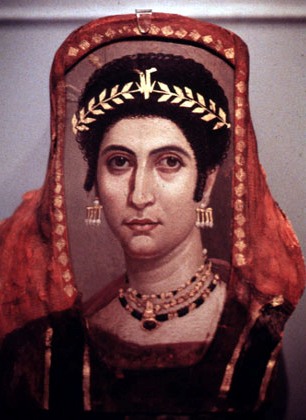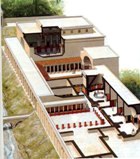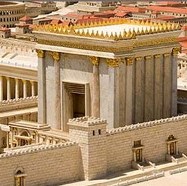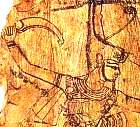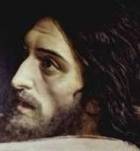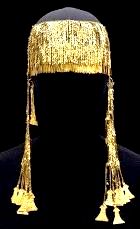Who was Salome?
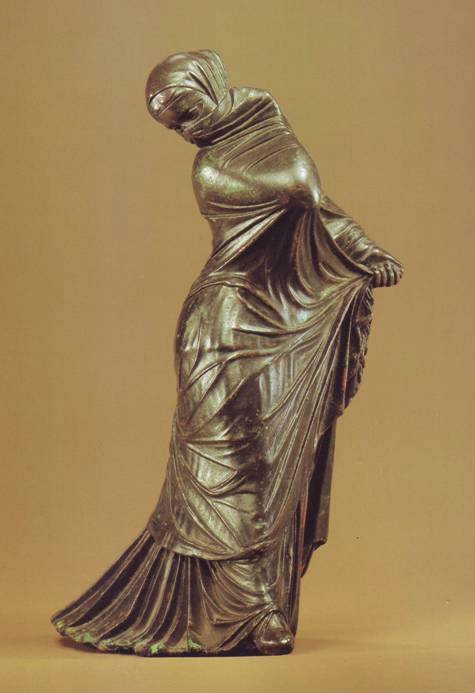
Veiled dancer, 2nd century BC
- Salome was King Herod’s step-daughter. She danced at a palace banquet, then asked for John the Baptist’s head as a reward. Herod gave her what she asked for.
- Did the royal family plan it together as a way of getting rid of John? Did Herod really have an incestuous passion for his step-daughter?
- Who knows? When John was executed, Salome and her mother Herodias were seen as the villains.
See Bible text, Mark 6:17-20, Matthew 14:1-5 below.
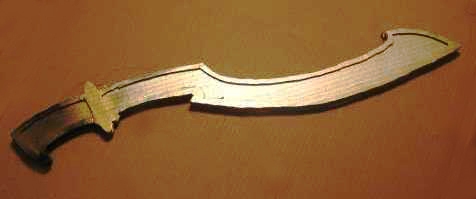
Scimitar sword, like the sword used to execute John
Who was Princess Salome?
Salome was the daughter of Herod Philip and Herodias.
- Her grand-father was the notorious King Herod, who executed most of his family and was said to have murdered the Innocents when Jesus was born.
- Her mother was Herodias, King Herod’s grand-daughter – at the time it was normal for royals to marry close relatives.
At the age of 14-16 years when this story happened, Salome was on the threshold of marriage, ‘a green fruit come to ripening’.

Salome has been repeatedly demonized by male artists and writers, as in this Ken Russell production (above)
She had been brought up in the sedate court of Philip. He was a dull but competent man. For little Salome, it was probably a secure environment.
But her mother Herodias was bored by Philip. She was a clever woman, frustrated in a provincial court.
Loving the wrong man
Herodias had fallen deeply in love with her husband’s step-brother, Herod Antipas. What was wrong with that? In Jewish law, a marriage between them would be incestuous. They went ahead anyway.
Why was this dangerous? In doing so, they played into the hands of critics of the royal family, notably John the Baptiser. At the time there was a war of nerves going on between John’s political/religious sect and Salome’s family.
Salome was politically astute enough, even though young, to see the danger her mother was in from John the Baptist.
She reacted in a way that was normal for children who experience any assault on their mother: she became very protective. When it came to the crunch, she was prepared to use her sexual power to do whatever she had to, to protect her mother.
In dancing before the guests at the banquet, she was saying to Antipas ‘Do what you should have done already. Protect my mother’.
What sort of person was Salome?
The Greek words ‘to korasion’ were used to describe Salome. The words describe a well-born young woman of marriageable age.
Ironically, these same words were also used in connection with the daughter of Jairus whom Jesus cured.
These two young women were of high social status, though from different worlds. The words ‘to korasion’ implied respect. But in Salome’s case it may have been ironic – Salome was a princess, but look what she did!
Who was Herodias, mother of Salome?
Herodias’ marriage to her first husband had not been a success, though it had produced Salome.
Then she fell madly in love with Philip’s half-brother, and he with her. They broke every rule so that they could marry each other, and they faced social condemnation because of it.
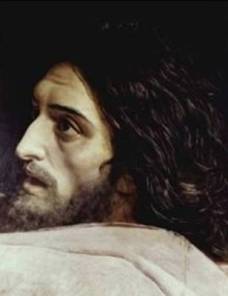
John the Baptist
Herodias, being the woman in the situation, was blamed more than Antipas. Perhaps this was because she came from a priestly family. The punishment for daughters of priestly families who behaved improperly was very severe.
- Was this another reason for John’s horror at her incestuous marriage?
- Was her sin worse because she came from a priestly background?
John, the prophet called the Baptist, attacked Herodias at least as much as he attacked her husband.
Herodias looked to Antipas to do something about it, but of course he did not. It was not in his nature. He was passive, where Herodias was a woman of action.
But she was also politically clever, and she knew she must bide her time, even though she must have seethed with frustration.
Who was Herod Antipas, who feared John?
Antipas seems to have been insecure, both personally and politically.
This is not surprising. His father Herod the Great had been a brilliant madman. Among many other atrocities, he strangled his princess-wife Mariamme in a fit of jealousy (real or feigned?) and also murdered her two sons.
Royal families seem to spawn the occasional madman, and the Hasmoneans were no exception. Antipas learned early that the best course of actions was to be passive.
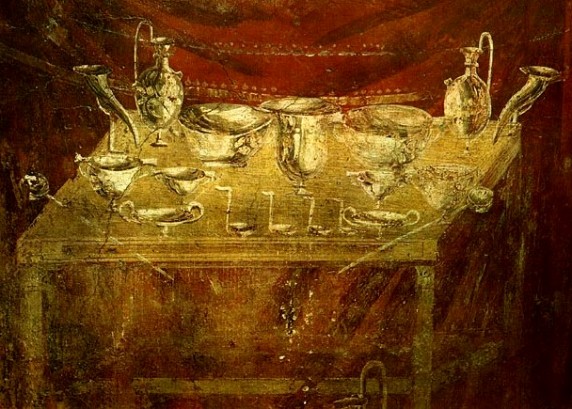
A selection of luxurious tableware from a painting excavated at Pompeii. Similar items would have been used at Herod’s banquet.
Herod Antipas is presented as a libertine (sex, banquet, luxury), but in fact he never had the multiple wives his father had, nor the murderous family feuds. He liked to utter threats rather than take action, hoping the threat would do the job.
He was a man of his time, believing in magic and magicians. He was also interested in theology and ideas.

Jesus called Herod Antipas ‘that fox’, not because he was cunning but because he was needlessly destructive, as foxes are
He may have had a roving eye, since people believed it when he made an extravagant promise to Salome – or they didn’t believe it but were clever enough not to say so.
Antipas preferred to put things off rather than take decisive action. And usually it was a woman who organised things for him.
- He only made a claim for his throne after his aunt, the older Salome, promised to help him.
- He did not actually leave his first wife: she left him.
- And as a final example, John had been denouncing him for quite some time before Herod consented to act.

Ancient Greek jewellery. Curiously enough, a snake was a symbol of eternal life.
So Herodias and Salome could not simply persuade him to act against John. They had to lever him into a position where he had no option other than to kill the prophet.
The truth is that the whole episode of Salome’s dance was probably a sham, to get rid of John the Baptist without losing too much face. Antipas has probably done this sort of twisty thing a dozen times before.
The question is,
- was Antipas a party to the plan all along?
- did the three of them, Antipas, Herodias and Salome, decide the whole thing together?
It is highly likely. Antipas’ lavish promise seems too improbable for a man who always put things off.
What were Salome’s motives?
- Salome was a young woman whose mother Herodias was under attack from an outsider, John the Baptist. Her response was to be protective of her mother. She stood by her mother and the interests of the Herodian family.
- Was Antipas attracted to her? If so, it may have made her uneasy, but she was shrewd enough to realise she could use it to her family’s advantage.
- In the end, Salome was as ruthless in disposing of an enemy as her grandfather Herod the Great had been. She was the lion’s cub.
What happened to Salome afterwards?
The gospels tell us nothing more about Salome, but history does.
According to Josephus, the ancient Jewish historian, Salome married Philip the tetrarch and afterwards Aristobulus, the grandson of Herod and brother of Agrippa. (Josephus: Antiquities 18.5.4)
She was what is nowadays called a ‘royal’, and seems to have had a long and comfortable life.
Main themes of Salome’s story?
- The misuse of power. John the Baptist made a valid objection of the marriage of Herod Antipas and his brother’s wife Herodias. For this he was punished with sudden death. Powerful people will not accept criticism.
- Blaming women. History blames Herodias and her daughter Salome for the death of John the Baptist, but what about Herod Antipas? He was the one in charge, yet he shifted the blame onto them, the women of his own family.
What do the names mean?
Salome: from the Hebrew ‘shalom’, meaning ‘peace’
Herod and Herodias were both family names linked to the Greek word ‘heros‘, hero or warrior.
The Bible text Mark 6:17-29
17 For Herod had sent and seized John, and bound him in prison for the sake of Hero’di-as, his brother Philip’s wife; because he had married her. 18 For John said to Herod, “It is not lawful for you to have your brother’s wife.”
19 And Hero’di-as had a grudge against him, and wanted to kill him. But she could not, 20 for Herod feared John, knowing that he was a righteous and holy man, and kept him safe. When he heard him, he was much perplexed; and yet he heard him gladly.
21 But an opportunity came when Herod on his birthday gave a banquet for his courtiers and officers and the leading men of Galilee. 22 For when Hero’di-as’ daughter came in and danced, she pleased Herod and his guests; and the king said to the girl, “Ask me for whatever you wish, and I will grant it.” 23 And he vowed to her, “Whatever you ask me, I will give you, even half of my kingdom.” 24 And she went out, and said to her mother, “What shall I ask?” And she said, “The head of John the baptizer.”
25 And she came in immediately with haste to the king, and asked, saying, “I want you to give me at once the head of John the Baptist on a platter.” 26 And the king was exceedingly sorry; but because of his oaths and his guests he did not want to break his word to her.
27 And immediately the king sent a soldier of the guard and gave orders to bring his head. He went and beheaded him in the prison, 28 and brought his head on a platter, and gave it to the girl; and the girl gave it to her mother.
29 When his disciples heard of it, they came and took his body, and laid it in a tomb.
Matthew 14:1-12
1 At that time Herod the tetrarch heard about the fame of Jesus; 2 and he said to his servants, “This is John the Baptist, he has been raised from the dead; that is why these powers are at work in him.”
3 For Herod had seized John and bound him and put him in prison, for the sake of Hero’di-as, his brother Philip’s wife; 4 because John said to him, “It is not lawful for you to have her.” 5 And though he wanted to put him to death, he feared the people, because they held him to be a prophet.
6 But when Herod’s birthday came, the daughter of Hero’di-as danced before the company, and pleased Herod, 7 so that he promised with an oath to give her whatever she might ask.
8 Prompted by her mother, she said, “Give me the head of John the Baptist here on a platter.”
9 And the king was sorry; but because of his oaths and his guests he commanded it to be given; 10 he sent and had John beheaded in the prison, 11 and his head was brought on a platter and given to the girl, and she brought it to her mother.
12 And his disciples came and took the body and buried it; and they went and told Jesus.
Paintings of Salome & John the Baptist
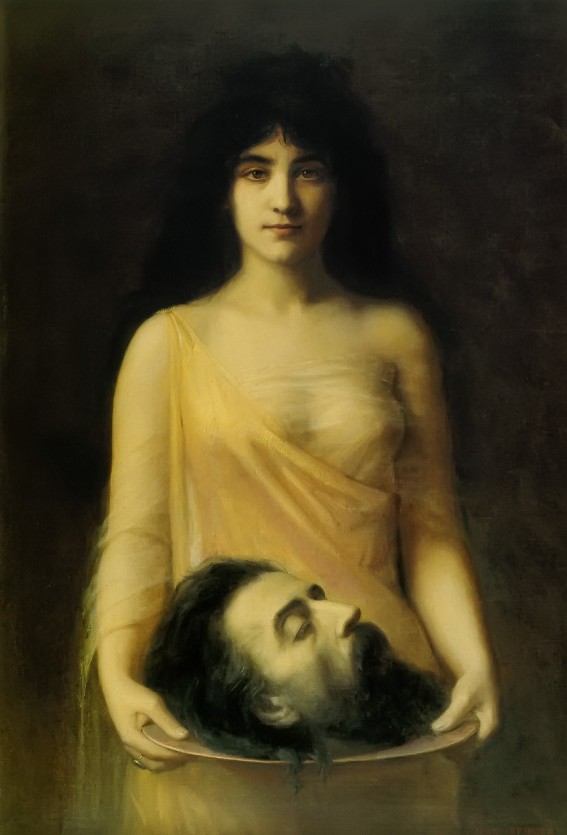
Salome, Jean Benner
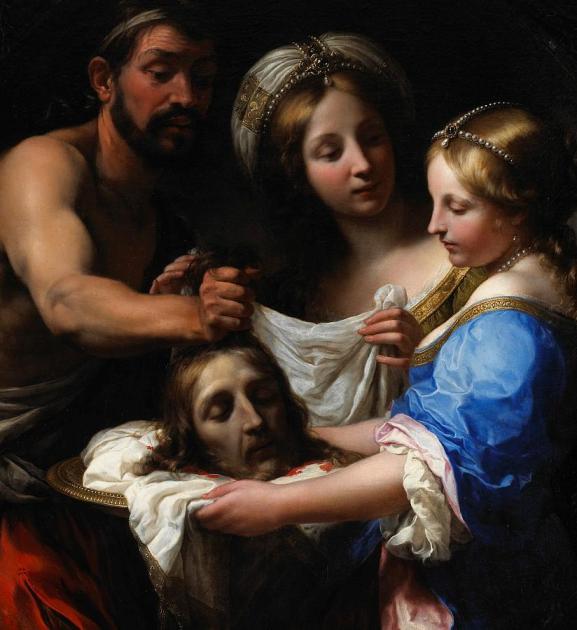
Herodias and Salome with the head of John the Baptist
Onorio Marinari
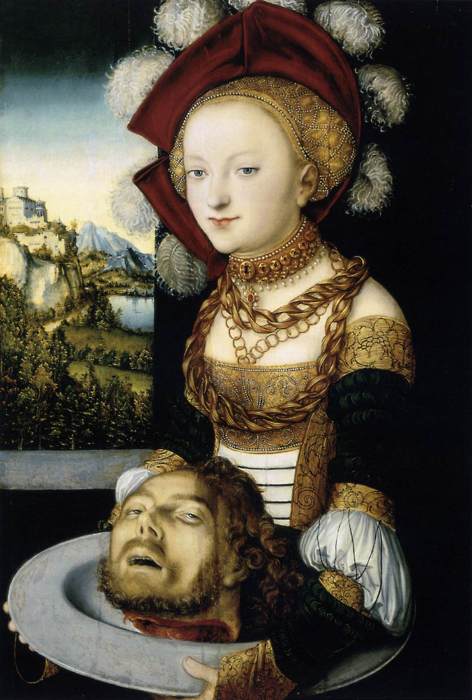
Salome, by Lucas Cranach the Elder, 1530
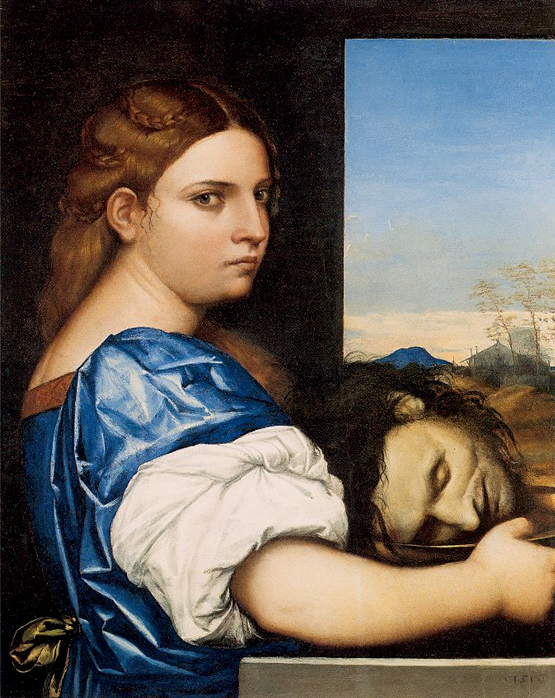
Salome with the head of John, Sebastiano del Piombo
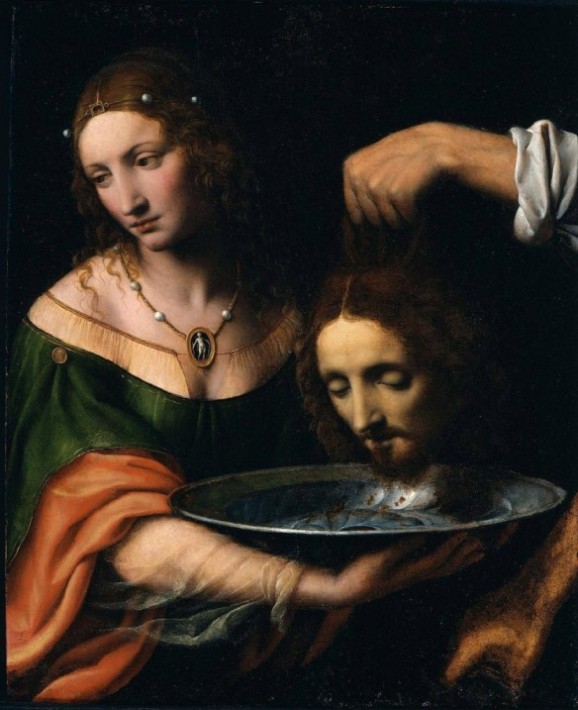
Salome with the head of John, Bernardino Luini

Salome’s Dance, Iman Maleki, Morteza Katouzian
Read about some fascinating women of the Old and New Testaments
Save
Save
Save
Save
Save
Save
Save
Save
Save
Bible Study Resource for Women in the Bible
Salome, John the Baptist, Herodias and Herod Antipas
© Copyright 2006
Elizabeth Fletcher

